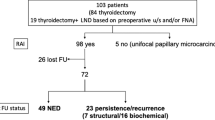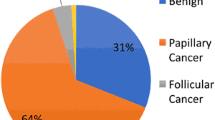Abstract
Purpose
The aim of this study was to assess the prognostic factors for treatment efficacy, and in particular the increase in serum thyroglobulin (Tg) level at the time of the first ablative radioiodine treatment, in patients with differentiated thyroid carcinoma (DTC).
Methods
A retrospective chart review was performed on 407 patients treated for DTC by total thyroidectomy and 131I ablation between 1995 and 2002, and examined 5–12 months later with diagnostic 131I whole-body scan and serum Tg measurement after thyroid hormone treatment withdrawal. At the time of the ablative radioiodine treatment, serum Tg level was determined just before 131I administration (TgD0) and 5 days later (TgD5); Tg variation was expressed as the ratio TgD5/TgD0. At the first post-ablation follow-up examination, unsuccessful ablation was defined by a Tg level ≥2 ng/ml and/or abnormal 131I uptake.
Results
Ablation was unsuccessful in 51 patients. Univariate analysis showed high TgD0 level, low TgD5/TgD0 ratio extrathyroidal invasion, 131I uptake in the neck (excluding the thyroid bed) during the ablative treatment and distant metastases to be significantly associated with unsuccessful ablation. On logistic multivariate analysis, TgD0 level <5 ng/ml and TgD5/TgD0 ratio ≥20 were independently associated with successful ablation. A receiver operating characteristic curve analysis determined that a TgD5/TgD0 ratio greater than 20 had a 97% positive predictive value for successful ablation. When both TgD0 and TgD5/TgD0 ratio were considered, that is, TgD0 <5 ng/ml or TgD0 ≥5 ng/ml but TgD5/TgD0 ratio >20, ablation was unsuccessful in only 12/301 patients.
Conclusion
Our data show that the TgD5/TgD0 ratio may be used as a new prognostic indicator of 131I treatment efficacy in patients with DTC.
Similar content being viewed by others
References
Schlumberger MJ. Diagnostic follow-up of well-differentiated thyroid carcinoma: historical perspective and current status. J Endocrinol Invest 1999;22 (11 Suppl):3–7
Dean DS, Hay ID. Prognostic indicators in differentiated thyroid carcinoma. Cancer Control 2000;7:229–39
Mazzaferri EL, Kloos RT. Clinical review 128: current approaches to primary therapy for papillary and follicular thyroid cancer. J Clin Endocrinol Metab 2001;86:1447–63
Cailleux AF, Baudin E, Travagli JP, Ricard M, Schlumberger M. Is diagnostic iodine-131 scanning useful after total thyroid ablation for differentiated thyroid cancer? J Clin Endocrinol Metab 2000;85:175–8
Mazzaferri EL, Kloos RT. Is diagnostic iodine-131 scanning with recombinant human TSH useful in the follow-up of differentiated thyroid cancer after thyroid ablation? J Clin Endocrinol Metab 2002;87:1490–8
Toubeau M, Touzery C, Arveux P, Chaplain G, Vaillant G, Berriolo A, et al. Predictive value for disease progression of serum thyroglobulin levels measured in the postoperative period and after 131I ablation therapy in patients with differentiated thyroid cancer. J Nucl Med 2004;45:988–94
Menendez Torre E, Lopez Carballo MT, Rodriguez Erdozain RM, Forga Llenas L, Goni Iriarte MJ, Barberia Layana JJ. Prognostic value of thyroglobulin serum levels and 131I whole-body scan after initial treatment of low-risk differentiated thyroid cancer. Thyroid 2004;14:301–6
Roelants V, Nayer PD, Bouckaert A, Beckers C. The predictive value of serum thyroglobulin in the follow-up of differentiated thyroid cancer. Eur J Nucl Med 1997;24:722–7
Baudin E, Do Cao C, Cailleux AF, Leboulleux S, Travagli JP, Schlumberger M. Positive predictive value of serum thyroglobulin levels, measured during the first year of follow-up after thyroid hormone withdrawal, in thyroid cancer patients. J Clin Endocrinol Metab 2003;88:1107–11
Ronga G, Filesi M, Ventroni G, Vestri AR, Signore A. Value of the first serum thyroglobulin level after total thyroidectomy for the diagnosis of metastases from differentiated thyroid carcinoma. Eur J Nucl Med 1999;26:1448–52
Hall FT, Beasley NJ, Eski SJ, Witterick IJ, Walfish PG, Freeman JL. Predictive value of serum thyroglobulin after surgery for thyroid carcinoma. Laryngoscope 2003;113:77–81
Muratet JP, Giraud P, Daver A, Minier JF, Gamelin E, Larra F. Predicting the efficacy of first iodine-131 treatment in differentiated thyroid carcinoma. J Nucl Med 1997;38:1362–8
Cramp WA, Yatvin MB, Harms-Ringdahl M. Recent developments in the radiobiology of cellular membranes. Acta Oncol 1994;33:945–52
Ramakrishnan N, McClain DE, Catravas GN. Membranes as sensitive targets in thymocyte apoptosis. Int J Radiat Biol 1993;63:693–7
Grunwald F, Menzel C, Fimmers R, Zamora PO, Biersack HJ. Prognostic value of thyroglobulin after thyroidectomy before ablative radioiodine therapy in thyroid cancer. J Nucl Med 1996;37:1962–4
Lin JD, Huang MJ, Hsu BR, Chao TC, Hsueh C, Liu FH, et al. Significance of postoperative serum thyroglobulin levels in patients with papillary and follicular thyroid carcinomas. J Surg Oncol 2002;80:45–51
Filesi M, Signore A, Ventroni G, Melacrinis FF, Ronga G. Role of initial iodine-131 whole-body scan and serum thyroglobulin in differentiated thyroid carcinoma metastases. J Nucl Med 1998;39:1542–6
Lima N, Cavaliere H, Tomimori E, Knobel M, Medeiros-Neto G. Prognostic value of serial serum thyroglobulin determinations after total thyroidectomy for differentiated thyroid cancer. J Endocrinol Invest 2002;25:110–5
Author information
Authors and Affiliations
Corresponding author
Rights and permissions
About this article
Cite this article
Bernier, MO., Morel, O., Rodien, P. et al. Prognostic value of an increase in the serum thyroglobulin level at the time of the first ablative radioiodine treatment in patients with differentiated thyroid cancer. Eur J Nucl Med Mol Imaging 32, 1418–1421 (2005). https://doi.org/10.1007/s00259-005-1866-0
Received:
Accepted:
Published:
Issue Date:
DOI: https://doi.org/10.1007/s00259-005-1866-0




